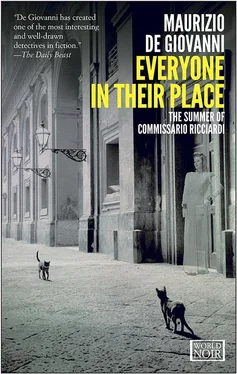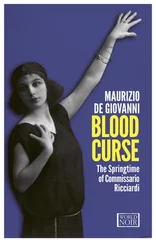Maurizio de Giovanni - Everyone in Their Place
Здесь есть возможность читать онлайн «Maurizio de Giovanni - Everyone in Their Place» весь текст электронной книги совершенно бесплатно (целиком полную версию без сокращений). В некоторых случаях можно слушать аудио, скачать через торрент в формате fb2 и присутствует краткое содержание. Жанр: Исторический детектив, Полицейский детектив, на английском языке. Описание произведения, (предисловие) а так же отзывы посетителей доступны на портале библиотеки ЛибКат.
- Название:Everyone in Their Place
- Автор:
- Жанр:
- Год:неизвестен
- ISBN:нет данных
- Рейтинг книги:4 / 5. Голосов: 1
-
Избранное:Добавить в избранное
- Отзывы:
-
Ваша оценка:
- 80
- 1
- 2
- 3
- 4
- 5
Everyone in Their Place: краткое содержание, описание и аннотация
Предлагаем к чтению аннотацию, описание, краткое содержание или предисловие (зависит от того, что написал сам автор книги «Everyone in Their Place»). Если вы не нашли необходимую информацию о книге — напишите в комментариях, мы постараемся отыскать её.
Everyone in Their Place — читать онлайн бесплатно полную книгу (весь текст) целиком
Ниже представлен текст книги, разбитый по страницам. Система сохранения места последней прочитанной страницы, позволяет с удобством читать онлайн бесплатно книгу «Everyone in Their Place», без необходимости каждый раз заново искать на чём Вы остановились. Поставьте закладку, и сможете в любой момент перейти на страницу, на которой закончили чтение.
Интервал:
Закладка:
“But instead, Commissa’, we found blackest hunger here too. We slept under the cart, one at a time, otherwise the rats would gnaw away at the noses and ears of our babies, I’ve seen it happen, trust me. And when it wasn’t rats, it was people who were even worse off than we are, who wanted to steal our few miserable rags. But then, one morning, when I came to this very piazza to ask the Madonna in the church to intervene on my behalf, I saw Signora Concetta, the housekeeper; she was talking to a shopkeeper and complaining about how it was impossible to find a doorman and a maid, and that she just couldn’t keep the household going all on her own.”
Sciarra’s eyes lit up at the recollection of that divine grace, accorded even before he could ask for it.
“I’ve thanked the Lord God every day, and I thank Him still. A position, a place: I finally had a place of my own. This was it, my place. My children could grow up under a roof, and they’d be able to get enough to eat. You can’t imagine how hungry we were. And what it meant to us to be able to eat, twice in a single day. My children forgot about hunger; the littlest girl never actually experienced it. But not my wife and me, Commissa’; we’ll never forget it. We still wake up at night, terrified, when we dream about going hungry and spending nights under the cart, with rain splashing in everywhere and the noise of chattering teeth. We looked death in the face, Commissa’.”
Looking death in the face: and he said it to him of all people. The duchess, who was dead, was looking him in the face; who knew how many years she would have still had to live.
“I can’t stand it, watching my children go hungry. I can’t even take it when they’re peckish. If my children ask me for food, I give it to them. I’m their father: it’s my duty. And maybe because when they were little they had nothing, now they always seem to be hungry; always, Commissa’. From when they wake up until night falls, they’d eat every second of the day. It’s not that they’re gluttons: it’s just that they’re hungry.”
Ricciardi remembered Sciarra’s two children, fighting over bread and cheese the morning the duchess was found dead.
“You wouldn’t believe what’s in the pantry in this house. No one eats a thing, one person goes there, the other goes here; and the duke, poor old man, lives on thin soups and broths. But from the farms they own, every delicacy imaginable comes pouring in, tons of food. They waste it, they let it go bad, they literally throw it away. It would break your heart to see the things they throw away every week: meat, pasta, fruit. With children dying of hunger in the middle of the street. It’s not fair, but that’s the way it is: everyone in their place. But where is everyone’s place? Can you tell me that, Commissa’?”
Ricciardi said:
“Go on. Tell me about that night.”
Sciarra ran his trembling hands over his face again. There was another rumble of thunder, closer this time.
“Signora Concetta, when she retires at night, locks the chain on the gate with the padlock. She goes straight to sleep, she’s a heavy sleeper, and she never wakes up until morning. Much later, never any earlier than two in the morning, the duchess would come home and go to bed; she’d unlock the padlock with her keys, she’d relock it, she’d put the keys in the drawer where Concetta would find them the following morning, and then she’d go to her bed. Sometimes she’d retire with. . with someone else, in other words. But the passages of keys and padlocks were always the same.”
“And so?”
“And so, a year ago, or thereabouts, I thought to myself: who would ever notice if a little piece of meat is missing from the pantry? Sooner or later they always wind up throwing it away, after all. My son, the eldest boy, was very sick. He’d turned white as a sheet, his blood counts were low. And I made a hasp ring, a ring of lead, identical to the ring that anchored the chain to the wall. And I replaced the real hasp ring with the lead ring. And at night, before the duchess came home for the night, I’d pry it open with my hands. I’m strong, you know: nobody’d ever believe just how strong I am.”
Maybe the duchess would believe it now, thought Ricciardi; since she couldn’t break free of your grip, the grip that suffocated her.
“From that day on, every so often, I’d pilfer a little something to eat. Not always, Commissa’. Just now and then. I’d slip in, take a little oil, a piece of meat, some bread. A hunk of cheese. That night, in fact, I’d taken a piece of cheese. The child was hungry, she’d asked me a hundred times, and I’d promised her some. Well, I walk out of the pantry and I come face to face with the duchess, with the keys in hand. She took one look at me and said: tomorrow you’re packing your bags and you’re out on the street. All of you. None of your family will ever set foot in this palazzo again. It’s not your place anymore. Do you see, Commissa’? Our place. The cart appeared before my eyes again, the rats, the rain. I thought about my little girl, who’d never lived in the street in her life. And I said to her, Signora Duchessa, take pity on me. And you know what she said? If you don’t get out of here, I’m going to scream. After that, I just lost my mind; outside you could hear the festival, the piazza was still full of people. It would mean humiliation, the worst mortification imaginable. So I grabbed the cushion and put it on her face.”
Ricciardi fell silent, picturing the scene.
“You fought; the duchess lashed out.”
Sciarra looked into the empty air, immersed in the murder he was reliving.
“Like a cat. She fought like a cat. She kicked, she scratched; I was wearing my uniform jacket; if I hadn’t been, she’d have ripped my arms to shreds. But then she stopped moving: she was still breathing, or at least I thought she was. I picked up the keys from the floor and I put them in the drawer, and I left. When I got home, upstairs, I realized I still had the piece of cheese in my hand. My wife started crying, and she’s crying still.”
Ricciardi shook his head; as incredible as it seemed, the true guilty party was hunger. Not some complicated love story, with its countless paths to murder, rage, possessiveness, jealousy; but instead none other than dull, stupid hunger, with its blind shrieking need.
By now the courtyard was almost dark; a muggy evening had fallen over the city. In the half-light, he heard the faint sound of footsteps, and Ricciardi glimpsed Sciarra’s two youngest children as they approached, hand in hand.
“Papa? Mamma wants to know, aren’t you coming up?”
The boy’s voice was worried, clearly by Ricciardi’s presence: what could that grim-faced gentleman want with their father? Sciarra replied:
“Yes, but you go up first. Tell Mamma that. . tell her that I’ll be up as soon as I can.”
The two children went off reluctantly; before turning away, the girl curtsied to Ricciardi.
“They’re beautiful, eh, Commissa’? My children really are beautiful. And they help me, you know. They do all the little chores around the house. And at school, they’re at the head of their classes. Who knows what their place is. Who can say what their place will be now.”
The thunder roared violently, and the wind picked up. Ricciardi shivered. Hunger, he thought. And the Capece family, the boy and the girl left without their mamma, with a father who was now a stranger, a father they’d have to forgive every day, though they could never forgive him entirely. And the duke dying alone in his bed, and Achille and Ettore and their love that could never see the light of day. And Sofia Capece, in the darkness of the room and the madness where she might spend the rest of her life.
Читать дальшеИнтервал:
Закладка:
Похожие книги на «Everyone in Their Place»
Представляем Вашему вниманию похожие книги на «Everyone in Their Place» списком для выбора. Мы отобрали схожую по названию и смыслу литературу в надежде предоставить читателям больше вариантов отыскать новые, интересные, ещё непрочитанные произведения.
Обсуждение, отзывы о книге «Everyone in Their Place» и просто собственные мнения читателей. Оставьте ваши комментарии, напишите, что Вы думаете о произведении, его смысле или главных героях. Укажите что конкретно понравилось, а что нет, и почему Вы так считаете.












